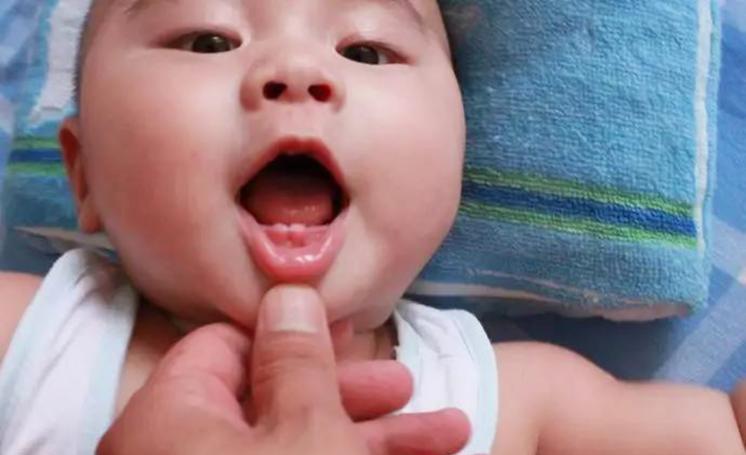When your baby is 4-7 months old, he will enter the teething period. Babies have different developmental conditions, some babies teeth early, some teeth later, these are normal phenomena. Some babies even have teeth around the age of one, and if they have not yet teethed at the age of one, they must take the baby to a regular hospital to find a dentist for further examination.
Babies in the teething period will become irritable, active, and cry. But in this period, after 6 months of the baby, the antibodies brought from the mother's body, that is, immunity, will slowly disappear; at this time, the baby must establish its own immune system, in this process the baby will appear sick, parents must distinguish whether the baby is sick or teeth.

What are the symptoms of your baby's teething period?
1. Irritability
Babies in the teething period are more sensitive and irritable than usual, and always like to let parents hold and comfort.
Parents can massage their baby's cheeks appropriately or use a teething stick.
2, more saliva than usual
When the baby teeth out, the baby's drooling phenomenon becomes more and more obvious, and the excessive saliva produced during the teething will flow wet on the chin.
Parents should pay attention to changing the bib frequently to avoid the baby growing rashes.
3. Itchy gums, bite things
As your baby teeth out, it irritates the gum nerves and your baby may experience itchy or painful gums. Your baby will react by biting on a toy or something.
At this time, parents can buy items such as teething sticks for the baby to alleviate oral discomfort. Or gently rub your baby's gums with your fingers, oral cleaning pads, or cotton swabs to reduce pain. If the baby is crying too much to alleviate, affecting sleep and appetite, please take the baby to the doctor in time.
4. Increased body temperature
During the teething period, many babies' body temperature will rise significantly, and the body temperature will generally not exceed 38 °, and parents can rest assured. Parents should pay attention to observation, if the baby's body temperature reaches more than 38.5 °, it is necessary to take the baby to seek medical treatment in time to find out the cause.
5. Restless sleep
Teething period of the baby will appear at night to wake up frequently, and irritability, crying, which is caused by oral discomfort caused by the baby can not sleep normally, this period, to let the baby have a quiet and comfortable sleep environment, to avoid affecting the quality of sleep.
Baby teething order
There are great differences in the time of teething in babies, and the time of teething of different babies is also different in morning and evening, but as long as it is within the range of individual differences, it is normal. Parents can pay attention to the correct order of teething in their babies to determine the status of their teething.
From this picture, we can see that when the baby is 10 months old, the lower front teeth should have developed early, and the upper incisors are also developing, and even some babies have even grown side incisors.
Some babies obviously reach the age of teething, but they have not moved, what is going on?
Factors influencing your baby's late teething
1. Genetic factors
Genetic factors or family history can also affect your baby's teething. If the parent's teeth are not in good condition, then the baby's teeth will not develop too well.
2. Nutrition
During a mother's pregnancy, insufficient intake of nutrients such as calcium and vitamin D can also lead to late teething in the baby.
The baby's teething period is particularly important for the mineral calcium and phosphorus, parents should pay attention to the baby's good growth and development and whether the body's calcium nutrition is balanced or not.
3. External force impact
Affecting the baby's late teething, the impact of the mouth by external forces is also one of the influencing factors.
4. Disease
For example, rickets, hypothyroidism, etc. Of course, the diseases that cause abnormal eruptions of deciduous teeth are often accompanied by other abnormal manifestations of the body. This requires a comprehensive diagnosis.
Do I need calcium supplementation after teething?
After eliminating the causes of the disease, as long as the diet is balanced and reasonable, the nutrition is sufficient, the baby will not be deficient in calcium.
If the baby has added complementary foods, eat some relatively hard foods, such as finger foods, teeth grinding biscuits, etc., exercise the baby's jawbone and gums, which is conducive to promoting the germination of teeth.
At the time of the baby's birth, the deciduous tooth embryo is already hidden in the gums. So parents do not have to worry, the baby is just teething late, as long as the baby's height, weight, head circumference size, movement development, language and other growth and development conditions are normal, there is no need to be too anxious, let alone blind calcium supplementation.